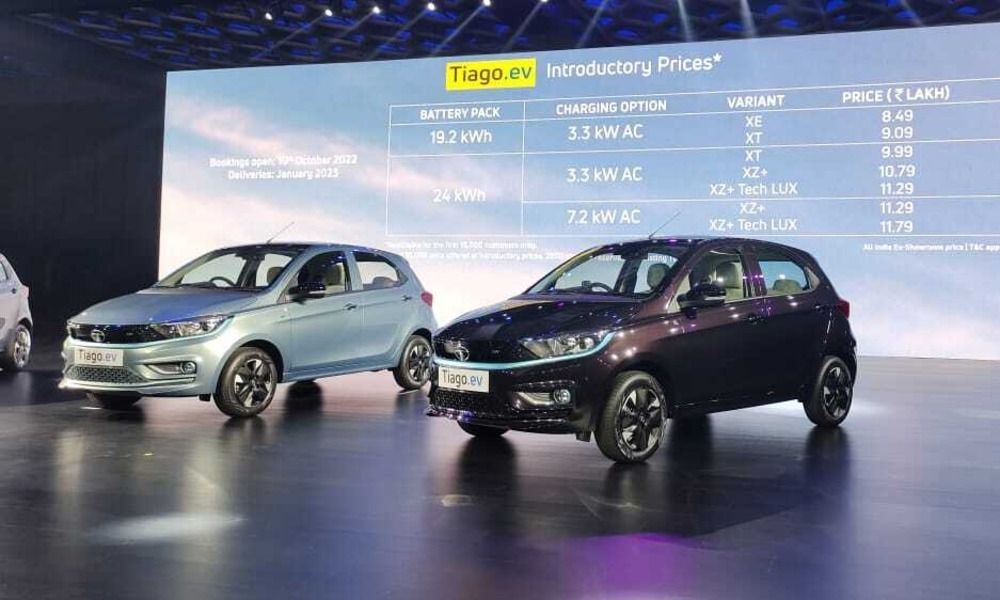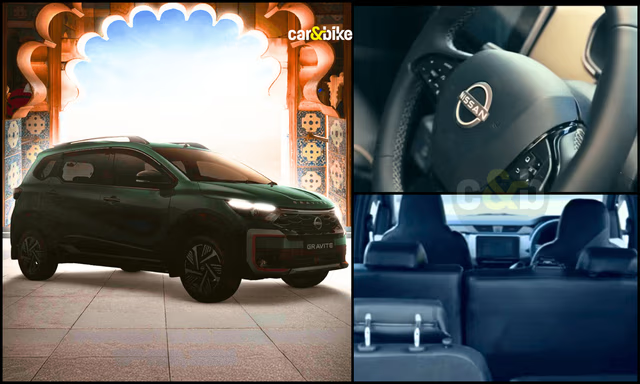Tata Motors Crosses 1 Lakh EVs Sales Milestone; 50,000 Tata EVs Sold In Just The Last 9 Months

- Tata Motors has produced more than 100,000 battery-powered cars till date.
- The Nexon EV continues to be India’s best-selling EV.
- Company sees India’s EV market growing to 1 million units a year by 2028.
Having firmly established itself as the leader in India’s electric passenger vehicle market, Tata Motors has today announced its all-time electric vehicle (EV) production has crossed the 1 lakh units milestone. The most recent 50,000 EVs were produced in the last nine months alone, says the carmaker. At present, Tata Motors is the only Indian carmaker to offer a fully-electric powertrain across three different body styles in the passenger vehicle space – hatchback (Tiago EV), sedan (Tigor EV) and SUV (Nexon EV). Tata also retails the Xpres-T, which is the Tigor EV repurposed for fleet buyers. At present, Tata’s EVs retail between Rs 8.69 lakh to Rs 19.29 lakh (all prices, ex-showroom, excluding state subsidies).
Also Read: Tata Nexon EV Crosses 50,000 Units Sales Milestone In Less Than 4 Years Since Launch
The Nexon EV has been India's best-selling EV since its launch in 2020.
At the announcement of the milestone, Tata Motors MD Shailesh Chandra reminisced about the start of the EV journey for Tata Motors, which began with the Energy Efficiency Services Limited (EESL) tender floated by the Indian government, leading to the creation of the original Tigor EV. In 2018, Tata was rolling out 100 EVs a month. It took Tata 44 months – or just under four years – to cross the 10,000 EVs mark. In 2023, that number has risen to 10,000 EVs a month; a 100-fold increase in uptake.
Also Read: Tata Motors Expands EV Focus, Aims for 50% Market Share by 2030
This rapid increase was catalysed by the arrival of the Nexon EV in 2020. Based on the capable sub-compact SUV, the Nexon EV has firmly established itself – and its maker, in the process – as India’s leading choice when it comes to EVs. The Nexon EV accounts for a substantial number of all Tata EVs sold till date, and its momentum received further impetus with the introduction of the upgraded Tigor EV in 2021, and the Tiago EV in 2022. The Tiago EV, at the time of its launch, was India’s most affordable electric car, and has been witnessing strong demand. Tata also recently became the first passenger vehicle firm to receive the automotive PLI certificate in the four-wheeler category by ARAI for the Tiago EV.
Also Read: Tata Punch EV Spied Again: New Details Uncovered
The Tiago EV is one of just two battery-powered passenger vehicles on sale in India with a sub-Rs 10 lakh starting price.
Tata highlighted the importance of subsidy support for EVs from states. In Maharashtra, before subsidies, Tata sold around 100 EVs a month, but when state subsidies (which rose to as high as Rs 2.50 lakh per vehicle) were rolled out, that figure leapt to 950 units a month. Once the subsidies were exhausted, the monthly sales in the state settled at 700 units, but they played a key role in reinforcing faith in EVs and driving adoption.
The company believes India’s EV market will grow to one million units a year by 2028, with 20 per cent of all passenger vehicles being sold having a battery-electric powertrain. To reach this target, Tata says the country needs a wider range of EVs to choose from, a vast (and readily accessible) charging infrastructure, continued government support in the form of subsidies till EVs make up 20 per cent of all passenger vehicle sales.
Tata Motors has previously announced its plans to launch 10 new EVs by 2025. These will include some models that are expected to debut over the next six to eight months, including the Harrier EV, Punch EV and Curvv coupe-SUV.
Latest News
 Jafar Rizvi | Feb 7, 2026Nissan Gravite Interior Spotted Ahead Of February 17 DebutThe Gravite’s interior appears to carry over the familiar layout from the pre-facelift Renault Triber, with only minor updates expected.2 mins read
Jafar Rizvi | Feb 7, 2026Nissan Gravite Interior Spotted Ahead Of February 17 DebutThe Gravite’s interior appears to carry over the familiar layout from the pre-facelift Renault Triber, with only minor updates expected.2 mins read car&bike Team | Feb 7, 2026Jawa 730 Twin UnveiledJawa Moto has introduced the 730 Twin, the fourth model in its lineup to be based on the 750 platform.2 mins read
car&bike Team | Feb 7, 2026Jawa 730 Twin UnveiledJawa Moto has introduced the 730 Twin, the fourth model in its lineup to be based on the 750 platform.2 mins read car&bike Team | Feb 6, 2026Indian Motorcycle Parts Ways With PolarisAs America’s first motorcycle brand prepares to celebrate its 125th anniversary, Indian Motorcycle has parted ways with former parent Polaris to become an independent company.1 min read
car&bike Team | Feb 6, 2026Indian Motorcycle Parts Ways With PolarisAs America’s first motorcycle brand prepares to celebrate its 125th anniversary, Indian Motorcycle has parted ways with former parent Polaris to become an independent company.1 min read car&bike Team | Feb 6, 2026BMW F 450 GS Based Sportbike Spotted On TestThe upcoming supersport machine is expected share the same parallel-twin engine with the upcoming BMW F 450 GS.1 min read
car&bike Team | Feb 6, 2026BMW F 450 GS Based Sportbike Spotted On TestThe upcoming supersport machine is expected share the same parallel-twin engine with the upcoming BMW F 450 GS.1 min read car&bike Team | Feb 6, 2026Tata Sierra Bookings Cross 1 Lakh Mark; Production Ramped UpWith bookings now in six-digit territory, Tata Motors is moving ahead with a phased ramp-up in production, while working through supplier-related constraints.1 min read
car&bike Team | Feb 6, 2026Tata Sierra Bookings Cross 1 Lakh Mark; Production Ramped UpWith bookings now in six-digit territory, Tata Motors is moving ahead with a phased ramp-up in production, while working through supplier-related constraints.1 min read car&bike Team | Feb 6, 2026Mahindra To Set Up Its Biggest Automobile Plant In Nagpur; Production To Begin In 2028The new facility will support next-generation platforms from the brand and will be capable of manufacturing multiple powertrains including ICE, EV & future technologies1 min read
car&bike Team | Feb 6, 2026Mahindra To Set Up Its Biggest Automobile Plant In Nagpur; Production To Begin In 2028The new facility will support next-generation platforms from the brand and will be capable of manufacturing multiple powertrains including ICE, EV & future technologies1 min read
 Bilal Firfiray | Feb 4, 2026Volkswagen Tayron R-Line Review: Sensible Flagship For IndiaVolkswagen has introduced a made-in-India flagship SUV that offers space, comfort, performance, and German driving finesse in a practical three-row package. But is the Tayron R-Line good enough?6 mins read
Bilal Firfiray | Feb 4, 2026Volkswagen Tayron R-Line Review: Sensible Flagship For IndiaVolkswagen has introduced a made-in-India flagship SUV that offers space, comfort, performance, and German driving finesse in a practical three-row package. But is the Tayron R-Line good enough?6 mins read Preetam Bora | Feb 2, 2026TVS NTorq 150 Road Test Review: Bigger, Better & More Efficient!We test the new TVS NTorq 150 out in the real world to get a sense of what it offers in terms of performance, dynamics and fuel economy.7 mins read
Preetam Bora | Feb 2, 2026TVS NTorq 150 Road Test Review: Bigger, Better & More Efficient!We test the new TVS NTorq 150 out in the real world to get a sense of what it offers in terms of performance, dynamics and fuel economy.7 mins read Bilal Firfiray | Jan 21, 2026Tata Punch Facelift Review: New Turbo Engine; Same Old SoulWith the update, the Tata Punch facelift retains its character of being a healthy runabout, which is perfect for Indian roads. But have these changes made it any better?7 mins read
Bilal Firfiray | Jan 21, 2026Tata Punch Facelift Review: New Turbo Engine; Same Old SoulWith the update, the Tata Punch facelift retains its character of being a healthy runabout, which is perfect for Indian roads. But have these changes made it any better?7 mins read Amaan Ahmed | Jan 17, 2026Bajaj Chetak C25 First Ride Review: Basic, Likeable E-Scooter For First-Time RidersThe Chetak C25, in quite a few ways, is poles apart from the larger and more powerful 30 and 35 Series models, but in its mannerisms, it is very much a Chetak.8 mins read
Amaan Ahmed | Jan 17, 2026Bajaj Chetak C25 First Ride Review: Basic, Likeable E-Scooter For First-Time RidersThe Chetak C25, in quite a few ways, is poles apart from the larger and more powerful 30 and 35 Series models, but in its mannerisms, it is very much a Chetak.8 mins read Bilal Firfiray | Jan 9, 2026Toyota Urban Cruiser Hyryder: 10,000 km Long-Term ReviewAfter spending over three months and 10,000 km with the Toyota Urban Cruiser Hyryder Hybrid, we were impressed by its real-world mileage, seamless hybrid, practical comfort, and Toyota reliability. Is it the best C-SUV then?5 mins read
Bilal Firfiray | Jan 9, 2026Toyota Urban Cruiser Hyryder: 10,000 km Long-Term ReviewAfter spending over three months and 10,000 km with the Toyota Urban Cruiser Hyryder Hybrid, we were impressed by its real-world mileage, seamless hybrid, practical comfort, and Toyota reliability. Is it the best C-SUV then?5 mins read












































































































































